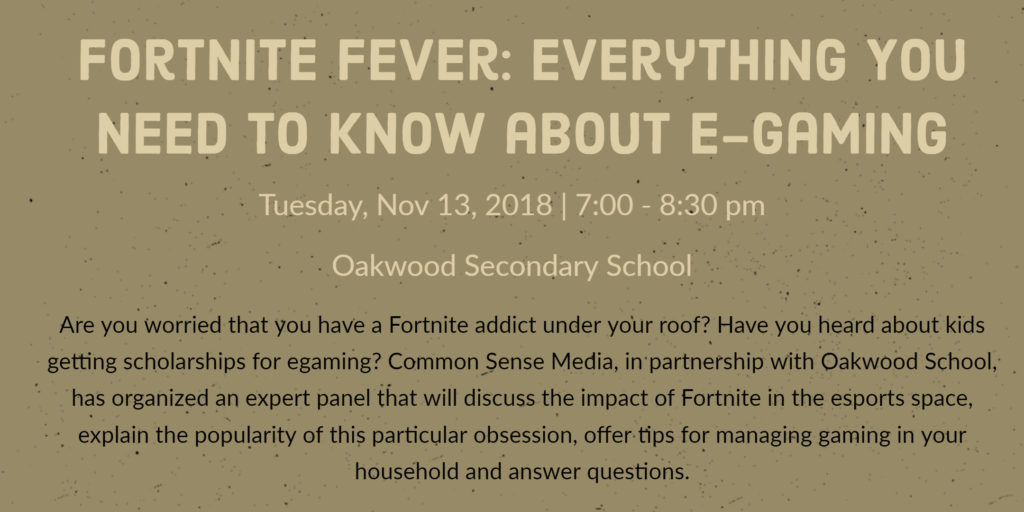Guest Blogger
Gaby Akana
Assistant Head of School + Middle School Division Head
“I’m the only one not playing Fortnite after school!”
“If you don’t let me do it, I will be left out!”
 Do these pleas sound familiar? If so, you are not alone; as parents and educators, we are all in this together.
Do these pleas sound familiar? If so, you are not alone; as parents and educators, we are all in this together.
There has been much debate in media expert circles about whether games like Fortnite and Overwatch are just the latest craze, or if our children’s engagement with online games could inflict long-term damage. Research in this area is just beginning to address questions about long-term outcomes.
As a school, we think it is worth discussing gaming as a community – especially because it involves interacting with strangers and violence online. With the advent of e-sports in colleges, it is clear that gaming is here to stay.
While there are a range of valid opinions, I did not discover evidence that children significantly benefit from playing games like Fortnite. There does seem to be merit to games that require teamwork and communication for players to succeed. Most perspectives on gaming include at least a cautionary stance, and many “pro gaming” positions rely on the inadequate argument that no direct and certain causal links have been found….yet.
While teamwork and social connections are undeniably positive outcomes, It is well-known that game designers use addiction and gambling psychology to hook kids in and keep them coming back. There is mounting research that proves excessive gaming has many negative effects, such as lack of sleep and impaired cognitive abilities – especially in regard to children’s ability to pay attention to tasks at hand. Gaming has a complicated relationship with anxiety as well. This is concerning, considering what we know about brain development through the sensitive years of adolescence.
We also observe that excessive gaming can put children at a disadvantage at school. Students are more prone to come to school tired and irritable; they may be less interested in empathizing with others; and they find it difficult to imagine or create things outside of the virtual realm with which they are somewhat obsessed. They also share (very candidly, in fact) the true gaming habits that they are adept at hiding from their parents – just try typing “how to hide gaming from my parents” into Google!
Gaming isn’t the only online activity that is of concern when used by children. Other gamer viewing and community platforms like YouTube, Twitch, and Discord are live and therefore unfiltered and uncensored. I always think of Lori Getz’s poignant question: if you wouldn’t drop your young child off at a concert alone with thousands of mostly older strangers, why would you let him/her venture into an online community by themselves? It’s important that we know what our kids are doing online, so we can have the full picture of what they are experiencing in cyberspace.
What can we do to address this? Is a balanced approach possible?
Here are some practical tips:
- Take devices out of the bedroom
- Talk to kids about the pros and cons; show them the research if necessary!
- Talk to other parents about what your child is reporting as the “norm” in other households
- Create a family agreement about screen time, and stick with it
- Limit screen time during the week, and you might consider Parenting Apps to help with this
- Make sure kids get a balance of other activities:
- school work
- physical play
- creative/genius time
- family time
- Get online and play with them so you know exactly what it’s all about
- Stay on your spot
- Be a role model in your family – put your own devices down!
- Take devices out of the bedroom!
We don’t have all the answers, but we do know that it sometimes requires entering into a “Battle Royale” with your child about something to which they may have become somewhat addicted. As the adults and “CEO’s” of our family organizations, it is important to make the best executive decisions for our kids’ brain development, even if they are disappointed and angry in the moment. If we take the long view, we can be assured that we are doing the right thing for our children’s sustained health and well-being.
I hope to see you at an upcoming Parent Education event on this topic sponsored by Common Sense Media. The event is free for Turning Point parents, but RSVPs are required.

Additional Resources:
- American Academy of Pediatrics’ stance on Children and Digital Media
- Common Sense Media links to Fortnite Game Review and Guide to Fortnite
- Center on Media and Children’s Health article on PIMU (Problematic Interactive Media Use)
- Techwalla is a website for advice about technology in the home
Gaby Akana
Assistant Head of School + Middle School Division Head
gakana@turningpointschool.org


































